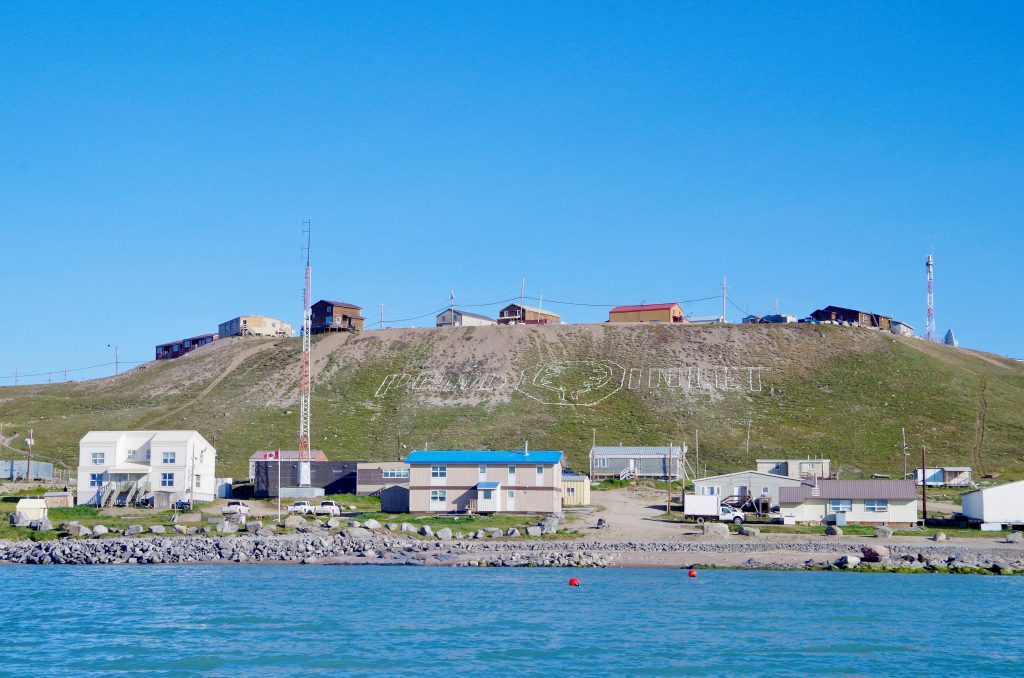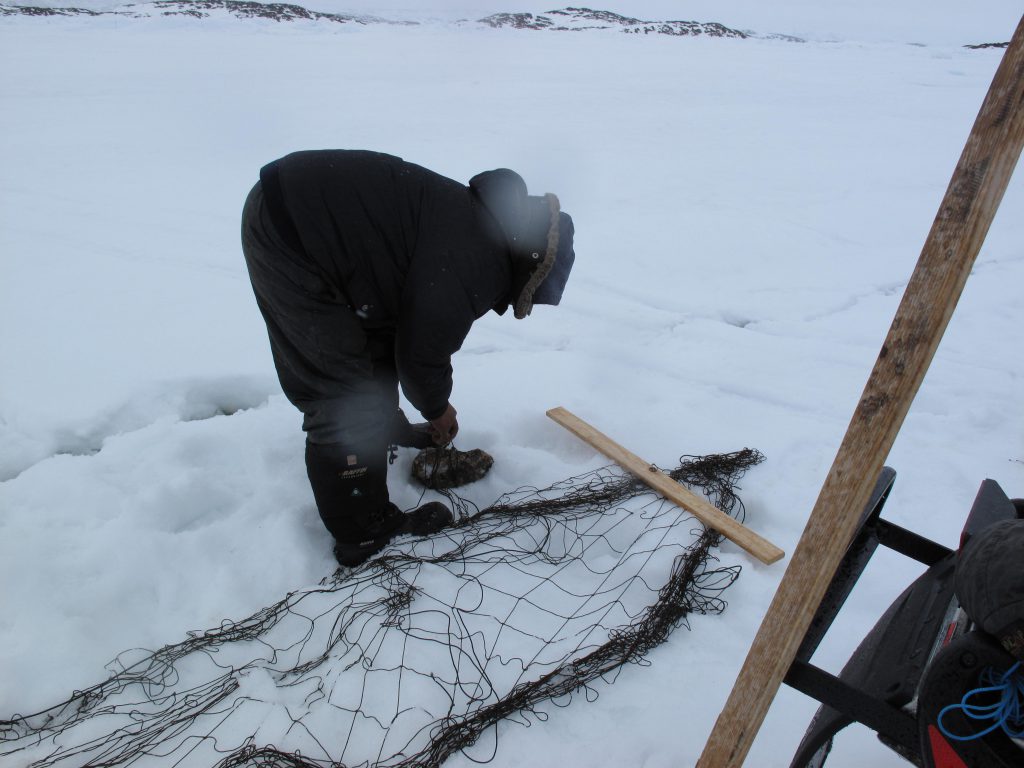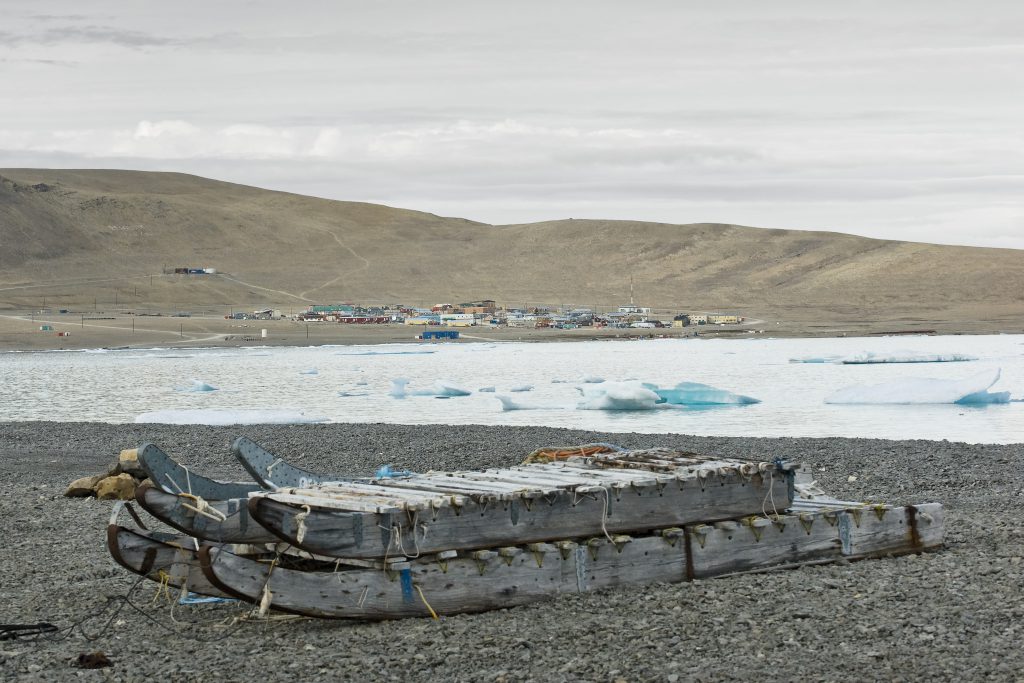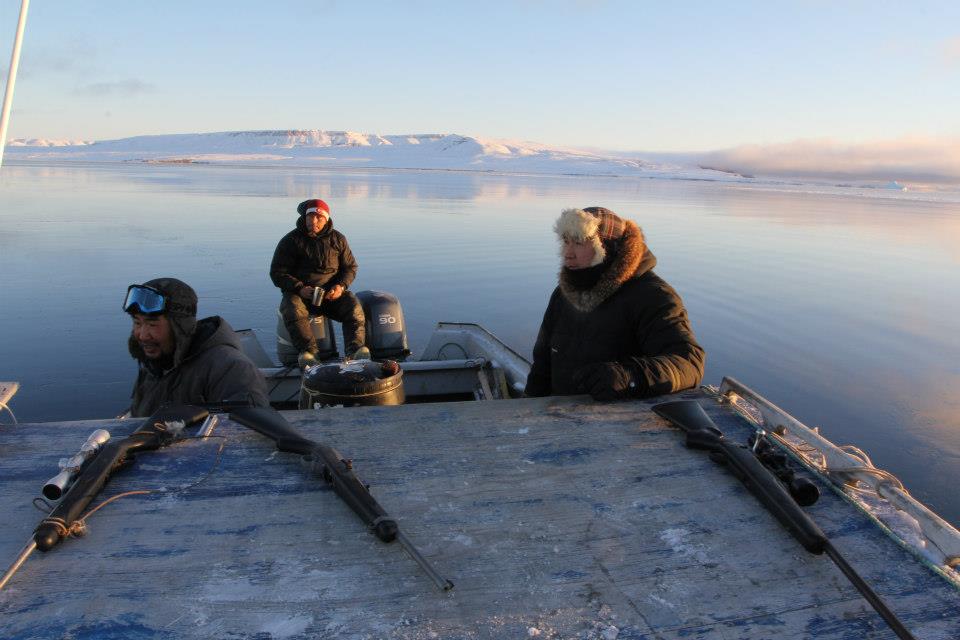Header photo: Niore Iqalukjuak
Esa Qillaq has nearly 40 years’ experience as a hunter – he is from Clyde River, on the east coast of Baffin Island in Nunavut. The role of the hunter in Inuit culture expands beyond providing food: hunters contribute to family, community, the maintenance of traditions, language, skills, and knowledge. They are stewards of land and culture, connecting many threads of the fabric of Inuit society.
Dr. Shari Fox, PhD., has lived and worked in Nunavut for over two decades, working with hunters and Elders to bring Inuit and visiting scientists together and study the environment and human-environment relationships. Esa and Shari have been research colleagues, collaborators, and friends for many years.
Amidst challenges to food security in the North, they wanted to find out how supporting and strengthening the roles of hunters and harvesters might improve community access to more nutritious, sustainable, and affordable foods. Their work together sparked an innovative blueprint that helps communities articulate the impacts of hunter/harvester programs with each other and to others across the country.

Food insecurity in the North
Recent studies cite concerning food insecurity rates in Nunavut. Food security is the ability to reliably access enough affordable, nutritious food. In 2017/18, Statistics Canada reported that 49% of households in Nunavut were food insecure, compared to the national average of 8.8%.
For Inuit, food sovereignty — the right to define one’s own food, and maintain consistent access to that food — is critical for maintaining culture, good nutrition, and Inuit-led and community-centered economies. Existing research on the value of local food indicates that every $50.00 invested in harvesting (including gasoline, ammunition, et cetera) yields enough meat to feed 20 individuals. The same $50.00 spent on imported meat at a local store feeds 3.3 people.
“There are healthy traditional foods right on our doorstep,” says Lori Tagoona, MakeWay Senior Associate for Inuit Nunangat, “and there is value in honouring and capitalizing on existing skillsets and existing resources. Investments in local food systems bring greater returns than subsidizing reliance on external food sources.”
Inuit hunters have always been at the center of Inuit life and culture. Hunters and harvesters provide the access to Inuit country foods. They hold the knowledge, skills, and values that facilitate the acquisition, sharing, and use of the food, and hold the keys for the next generations to follow.
“There’s a strong understanding amongst Indigenous communities in this country that full time land-based professions like hunting or harvesting, monitoring or stewarding, those are all things that we northerners understand very deeply, very intuitively — but at times it’s been very hard to communicate that value to broader audiences, such as government funders or foundations,” says Steve Ellis, MakeWay Program Lead for Northern Canada.
Full-time hunter/harvester programs have been formally funded in the past. However, there have been significant challenges to northern communities seeking support from the government for these programs because of how they’ve been set up and operated. There have also historically been restrictive benefits, opaque application and approval processes, and a lack of administrative support.
“Given the critical nature of these programs within their communities, we felt it was very important to try and develop some tools that would be available for anyone to use in order to demonstrate the value of these programs in a language or framework that external audiences understand,” explains Steve.

Honouring existing skills and assets within communities
In 2017, Esa and Shari decided to undertake a pilot project together, to investigate the value of supporting a full-time hunter position in Clyde River. They tracked harvesting activities, challenges, opportunities, and impacts, to develop an approach for how a project might be evaluated, with an eye to applying the framework to similar harvester programs across the North.
This pilot project was not addressing a new idea — rather, a very old one. It aimed to demonstrate how a way of life that has existed since time immemorial might be better supported by modern-day socio-economic infrastructure, conveying the critical roles that hunters play in communities, and the need to support them consistently. It responded to concerns over food security and movement toward food sovereignty by taking a snapshot of what roles a full-time hunter might play in the local economy, one centered around Inuit culture, at a time when Inuit are challenging and adapting colonial systems and institutions.
To carry out this pilot study, a position of full-time hunter was created through Ilisaqsivik Society, an Inuit charitable non-profit organization located in Clyde River, with support from MakeWay. As a full-time hunter, Esa was paid a salary comparable to other professions in the community like teachers, health care workers, or government employees. His job description was to be the hunter that he is. The details of where, how, or when were self-directed, putting him in charge of deciding each day how he would be harvesting, as well as how he would prepare, store, and share harvested foods. He kept a record of his activities via a hunting diary.
“We recognized from the outset the roles that full-time hunters might play in this and in shifting to and defining an Inuit-centered economy, and strengthening Inuit culture, language, health, society, and values. We kept these things in mind as we approached the pilot and thought about how the project (the idea of supporting full-time hunting) might work,” wrote Shari in the initial research report.
After one year, Esa had harvested nearly 2,000 kg of edible meat — largely seal, char, and ptarmigan. He shared the food with his immediate family, friends, the Clyde River community, and in some cases to family and friends in Iqaluit and to the Baffin Inuit medical boarding home in Ottawa.
The benefits of the study extended far beyond the amount of food harvested. Esa and Shari highlighted the individual and communal cultural importance of fulfilling a hunter role, including consistent observations and monitoring of the environment, sharing knowledge and skills with youth, and maintaining language and terminology.
In addition to providing more sustainable, nutritious, and affordable food for hundreds of individuals over the course of the pilot project, Esa and Shari noted the many social, cultural, environmental, health, and economic benefits for everyone involved. The initial research project led to an exploration of how formal evaluations of hunter programs could look if led by communities, where each program would be uniquely designed and implemented according to the community in which it was developed. These evaluations could garner funding more easily by translating the value of hunter programs for external audiences.

Scaling Northern-led change
In summer 2021, MakeWay released the Hunter/Harvester/Guardian Evaluation Toolkit, in collaboration with Dr. Fox and informed by Shari and Esa’s joint research. The Toolkit’s development involved direct engagement with northern and Indigenous organizations and communities to co-create a set of processes and tools that capture the impacts of full-time hunter programs, from the planning stages to monitoring and evaluation.
The Toolkit, available for anyone to access, helps hunters and communities identify and articulate what support their hunters need, what activities they undertake, and what the outcomes are for their networks. This flexible framework also aims to help northerners share knowledge of their unique programs with one another. The Toolkit empowers hunting and harvesting program teams to communicate their many benefits to external audiences and generate financial support.
MakeWay is now working alongside many Indigenous organizations and communities to implement the Toolkit and demonstrate the benefits of hunter programs at scale across the North.
_________
At MakeWay, our Northern Program helps accelerate local, diversified economies routed in strong local cultures, by exploring the economic pathways that uplift Indigenous culture and demonstrate the economic value of healthy ecosystems and Indigenous cultures. We strive for sustainable, community-based enterprises that are viable and are proven to deliver social, economic, and environmental benefits to Northern communities.
We also support existing and emergent culture and language work led by northerners, working alongside partners to help communities deepen their connections to their culture and their homelands, as well as to share knowledge and facilitate collaboration amongst communities and organizations to amplify best practices and scale successes.
Learn more about MakeWay’s Northern Program here.
Access the Hunter/Harvester/Guardian Toolkit information webinar here.
